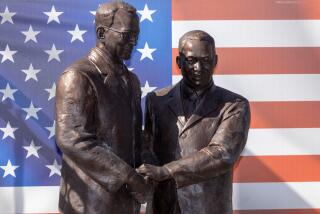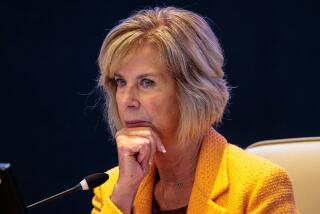Unlike Rival, Hahn Won’t Release Calendar
Los Angeles Mayor James K. Hahn has declined to publicly disclose his appointments calendar, even though his mayoral opponent, Antonio Villaraigosa, has released the schedule of his activities since he was elected to the City Council in 2003.
Hahn’s decision puts him at odds with many of the state’s public officials, who decided to disclose their once-secret calendars after California voters overwhelmingly passed a constitutional amendment in November that encouraged more openness.
In recent months, Gov. Arnold Schwarzenegger, Atty. Gen. Bill Lockyer and the state’s other constitutional officers have released their calendars. And the mayors of San Diego and San Jose also make their schedules available to the public.
“I have no secrets,” Schwarzenegger said in announcing last fall that he would release his calendar.
Villaraigosa released 301 pages of his calendar after The Times requested it last month under the California Public Records Act.
The calendar shows that Villaraigosa launched his career as a city councilman with days full of official meetings and events, but by November was scheduling up to four hours a day for his campaign to unseat Hahn.
The mayor’s office announces most of his public appearances, but provides no information on his private meetings. The Times, however, obtained a number of Hahn’s schedules from 2003. They indicate that Hahn was raising money for his reelection campaign as early as June 2003, and setting aside time throughout that year for campaign activities.
The Times first asked on Jan. 6 for Hahn’s schedule, starting with the day he took office in 2001, and repeated the request Wednesday after Villaraigosa released his calendar.
“For security reasons and concerns, we do not release the mayor’s schedule,” mayoral spokeswoman Shannon Murphy said Wednesday. She declined to explain how Hahn’s security situation differed from the governor’s.
Until recently, many state politicians resisted making their calendars available to the public, pointing to a 1991 California Supreme Court decision that supported Gov. George Deukmejian’s 1988 refusal to turn over his calendar.
But in November, 83% of voters approved Proposition 59, which placed the public’s right of access to government documents and meetings in the state Constitution.
The next month, Schwarzenegger turned over his schedule in response to a request from the California First Amendment Coalition, a nonprofit organization that includes newspapers, such as The Times, and advocates for open government. By March, all of the constitutional officers had followed Schwarzenegger’s lead.
“This goes hand in hand with representative democracy,” said Peter E. Scheer, executive director of the First Amendment Coalition. “One’s vote cannot be fully informed unless you know what your government representatives have really been doing.”
Hahn’s office has provided other information requested by The Times, but this is not the first time the mayor’s office has refused to provide public documents.
Nearly a year after The Times asked for e-mails to and from former Deputy Mayor Troy Edwards, the mayor’s office has provided only 17 e-mail exchanges. Federal authorities also have asked for e-mails to and from Edwards, who was Hahn’s liaison to the port, airports and Department of Water and Power agencies until he resigned last year.
Villaraigosa Chief of Staff Jimmy Blackman said the councilman was happy to provide his calendar. “It is our hope that other city officials display the same willingness to demonstrate open, transparent government,” Blackman said.
He said Villaraigosa had redacted only phone numbers and “a small number of personal family-related meetings or appointments” in the calendars.
The schedules show a public official whose days after his 2003 election were packed with meetings and public events as the former Assembly speaker sat down with city officials and community leaders and went to neighborhood meetings, cultural events and other ceremonies.
Last April 27 -- as he was publicly debating whether to enter the mayor’s race -- Villaraigosa listed a meeting with Bill Wardlaw, Hahn’s influential strategist.
Through 2004, Villaraigosa’s schedules increasingly featured events around the country for Massachusetts Sen. John F. Kerry, the failed 2004 Democratic presidential candidate. Villaraigosa was a co-chairman of the campaign.
And after Villaraigosa announced in August that he would run for mayor again, his schedule began to fill with hours set aside for campaigning. By November, the calendar indicates, the councilman was routinely reserving more than four hours a day to call potential campaign donors and attend fundraising events.
Villaraigosa also was meeting with campaign allies and donors, including Keith Brackpool, a politically connected entrepreneur who pushed a controversial water project in the Mojave Desert.
The Hahn calendars obtained by The Times -- which include detailed schedules for 44 days from February through August 2003 -- are marked “confidential” with the caution: “Not for distribution.”
They show a mayor who also was taking time out from his official duties as early as June 2003 for fundraisers, scheduling 10 campaign-related events over the 44 days.
The mayor’s days also often featured one or two official events or news conferences. And he scheduled meetings with a number of foreign dignitaries, including the lord mayor of London and Pakistan’s President Pervez Musharraf.
Hahn was also scheduled to meet with several lobbyists and businessmen who had business with the city, including airport contractor URS.
That firm’s executives told federal authorities last year that they lost an airport contract because the company did not contribute to Hahn’s 2002 campaign against San Fernando Valley secession.
On April 2, 2003, the schedule indicates, the mayor and his fundraiser had lunch in Beverly Hills with developer Alan Casden, whose company had given Hahn $1,000 five months earlier. A Casden executive also met with Villaraigosa in March 2004, according to Villaraigosa’s schedule.
Most of Hahn’s meetings were with city officials, including City Council members and the police chief. On some days, he met with no one who did not work for the city.
Times staff writers Robert J. Lopez and Rich Connell contributed to this report.
More to Read
Get the L.A. Times Politics newsletter
Deeply reported insights into legislation, politics and policy from Sacramento, Washington and beyond. In your inbox three times per week.
You may occasionally receive promotional content from the Los Angeles Times.











